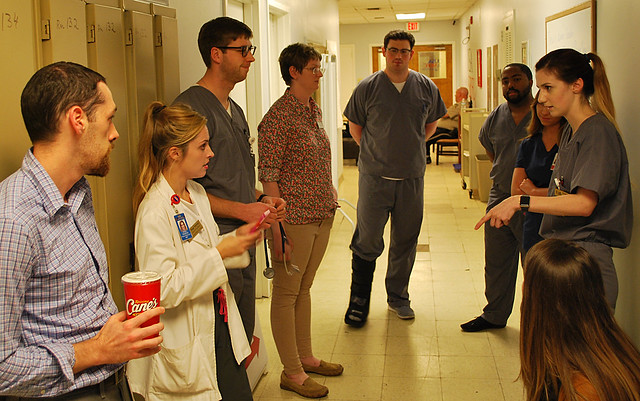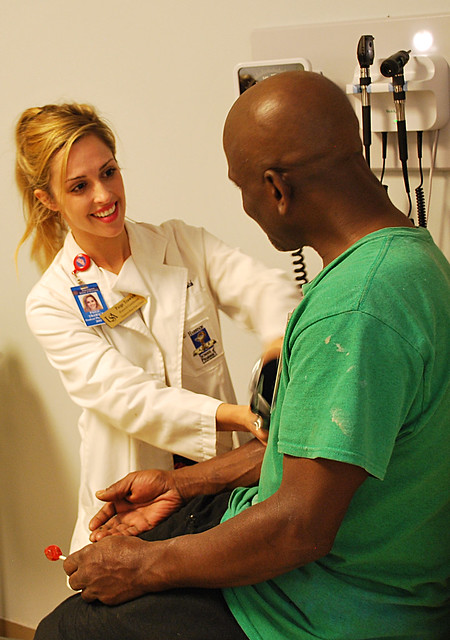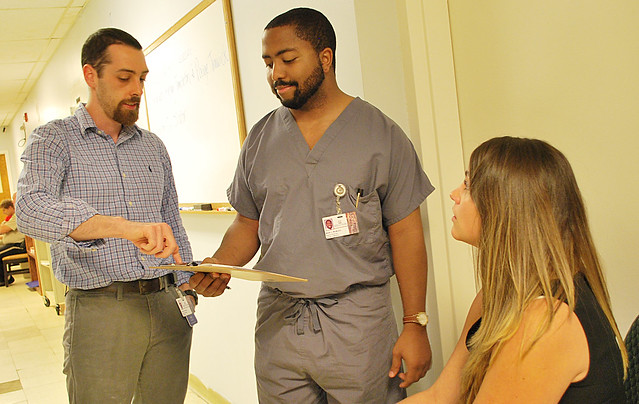Auburn University pharmacy students make impact at Mobile Clinic
Article body
The curriculum in the Harrison School of Pharmacy at Auburn University emphasizes problem solving and teamwork. Three years ago, a group of first-year students on the school’s Mobile campus recognized a problem and used teamwork to solve it.
After seeing the community impact at Equal Access Birmingham, a student-run free clinic where Auburn pharmacy students and medical students at the University of Alabama at Birmingham partner to serve the area’s medically underserved, the group considered starting a similar clinic in Mobile. Led by Class of 2018 members Anthony Todd, Frankie Hoffman, Austin Cook and Josh Francis, the students reached out to friends in other health disciplines and the foundation was laid for what became the University of South Alabama Student-Run Free Clinic.
The clinic exemplifies the university’s land grant mission of access and service through institutional, research and outreach programs for the citizens of Alabama.
Originally housed at the 15 Place homeless shelter in Mobile, the organization recently moved to a larger space at the Salvation Army of Coastal Alabama, located on Dauphin Street in downtown Mobile. The clinic, which includes students from several different health care disciplines, is open every Friday from 12-4:30 p.m.
Patients of the clinic are often homeless or in one of the recovery programs offered through the Salvation Army.
“It is important for us to help this specific population because they don’t have access and they don’t have the type of insurance that is going to provide them with all their medical needs,” said Paige Trawick, a member of pharmacy’s Class of 2019. “They can’t always afford to go to the hospital to get their procedures done and get medication. We can work with the patient and tell them about resources to assist with all their health care needs.”
Collaboration and teamwork are major themes in the clinic with participation from students across several disciplines, including pharmacy, medicine, nursing, audiology, physical therapy, occupational therapy, behavioral health, social work and recreational therapy.
“We are each a part of the puzzle,” said Trawick. “Sometimes they don’t always know what medications are best because certain disciplines may focus on other things that pharmacists went to school for. It really helps us solve the problem as a whole, instead of looking at just a piece of a problem that a patient has.”
For Francis, one of the students who helped establish the clinic, teamwork was a big motivator in bringing everyone together.
“Health care is moving to where a patient is going to have to be managed by several different people,” he said. “We just had a patient who had a sprained ankle that was treated by a physician to determine if it was broken, then the physical therapist discussed it, nurses managed the treatment and pharmacy was there for medication management. So, when you look at the illness, or chronic management, there are several different disciplines involved in everyday life and this is a good representation.”
His sentiments were echoed by Dr. Nicole Slater, an assistant professor who serves as a faculty advisor for the clinic.
“I think it’s really important because if you look at any career in pharmacy, you are going to be interacting with other health care professionals, particularly these days. It’s a lot more team-based, more patient-centered care,” said Slater. “You are getting a team of health care professionals taking care of a person because that is the direction health care is moving.”
Slater said she sees how students are changing the perception of a pharmacist among the other health care disciplines.
“Faculty in other disciplines have nothing but good things to say about the pharmacy students about how they’re teaching other students how to counsel and educate patients on their medications and how to approach a patient with proper questioning,” she said. “I think it is good for them to see that side of it, that pharmacists don’t just stand behind a counter and count pills.”
Having been there from the start, Francis said he has seen similar growth among the pharmacy students at the clinic and how others learn from them. With graduation just around the corner, he said he is excited to see how the role of pharmacy continues to grow in the clinic.
“I know the original goal was to get an interdisciplinary team all working together, and it’s really neat to see how far we’ve come,” he said. “To see the teamwork between everybody is great and to see how every discipline functions within the team as equals is great.”
Related Media
Media interested in this story can contact Communications Director Preston Sparks at (334) 844-9999 or preston.sparks@auburn.edu.
Auburn University's Harrison College of Pharmacy is ranked among the top 20 percent of all pharmacy schools in the United States, according to U.S. News & World Report. Fully accredited by the Accreditation Council for Pharmacy Education (ACPE), the School offers doctoral degrees in pharmacy (Pharm.D.) and pharmaceutical sciences (Ph.D.) while also offering a master's in pharmaceutical sciences. For more information about the School, please call 334.844.8348 or visit the Harrison College of Pharmacy website.







